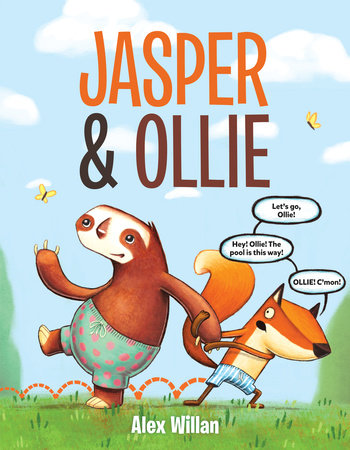Are You a Jasper or an Ollie?
Author Alex Willan on Helping Kids Be Self-Aware
by Alex Willan
With Jasper & Ollie, I wanted to write a picture book about two characters, one fast and one slow, and I wanted the characters to be involved in a race. If you feel like this premise sounds familiar, you’re not wrong.
Of course, this story has been told before, and not just in The Tortoise and the Hare. From the outset, though, I wanted to examine this familiar idea from a different point of view (plus my book is about a fox and a sloth, so you see, it’s totally different!). What if the characters aren’t competitors but friends? What if the story is less about their physical speed but rather the speed at which they each approach an activity? And what if it isn’t about one character being “right” and one character being “wrong,” but about what they can learn from each other?
Like Jasper, my mind is always getting ahead of itself. (Even now, I’m trying to figure out what the last line of this essay should be.) With little effort, I can become consumed with a series of events that’s taken place only in my brain. While this isn’t something I feel I have complete control over, that doesn’t mean I can’t benefit from a bit of self-awareness. I’ve learned to be mindful of the fact that my way of thinking can lead to less than rational conclusions. While this is hardly a superpower (Citizen, I am here to save you from imminent danger! Or probable discomfort … or maybe a possible inconvenience?), it’s proven itself useful when it comes to writing. After all, a large part of writing is mentally placing your characters into various situations and then imagining how it would play out.
 In the same way, both Jasper and Ollie could benefit from a bit more self-awareness. It becomes quite clear that Jasper has gotten ahead of himself in his rush to track down Ollie at the pool. Ollie, on the other hand, is prone to distraction. One could argue this trait is less disruptive in the overall story, but he too could benefit from being more mindful of his actions (it might not be the best time to stop and paint a fence when your friend is waiting for you at the pool).
In the same way, both Jasper and Ollie could benefit from a bit more self-awareness. It becomes quite clear that Jasper has gotten ahead of himself in his rush to track down Ollie at the pool. Ollie, on the other hand, is prone to distraction. One could argue this trait is less disruptive in the overall story, but he too could benefit from being more mindful of his actions (it might not be the best time to stop and paint a fence when your friend is waiting for you at the pool).
I hope readers find they identify with Jasper or Ollie. More importantly, no reader should feel like the character they relate to is wrong for being the way they are. One character isn’t better or worse than the other; they are who they are! Sure, Jasper could slow down, and Ollie could pick up the pace, but in the end there’s only so much they can do to change their nature (they are a fox and a sloth after all). What they — and all of us — can do is learn to better appreciate the effect our behavior has on the world around us.
-
Get the Book:

